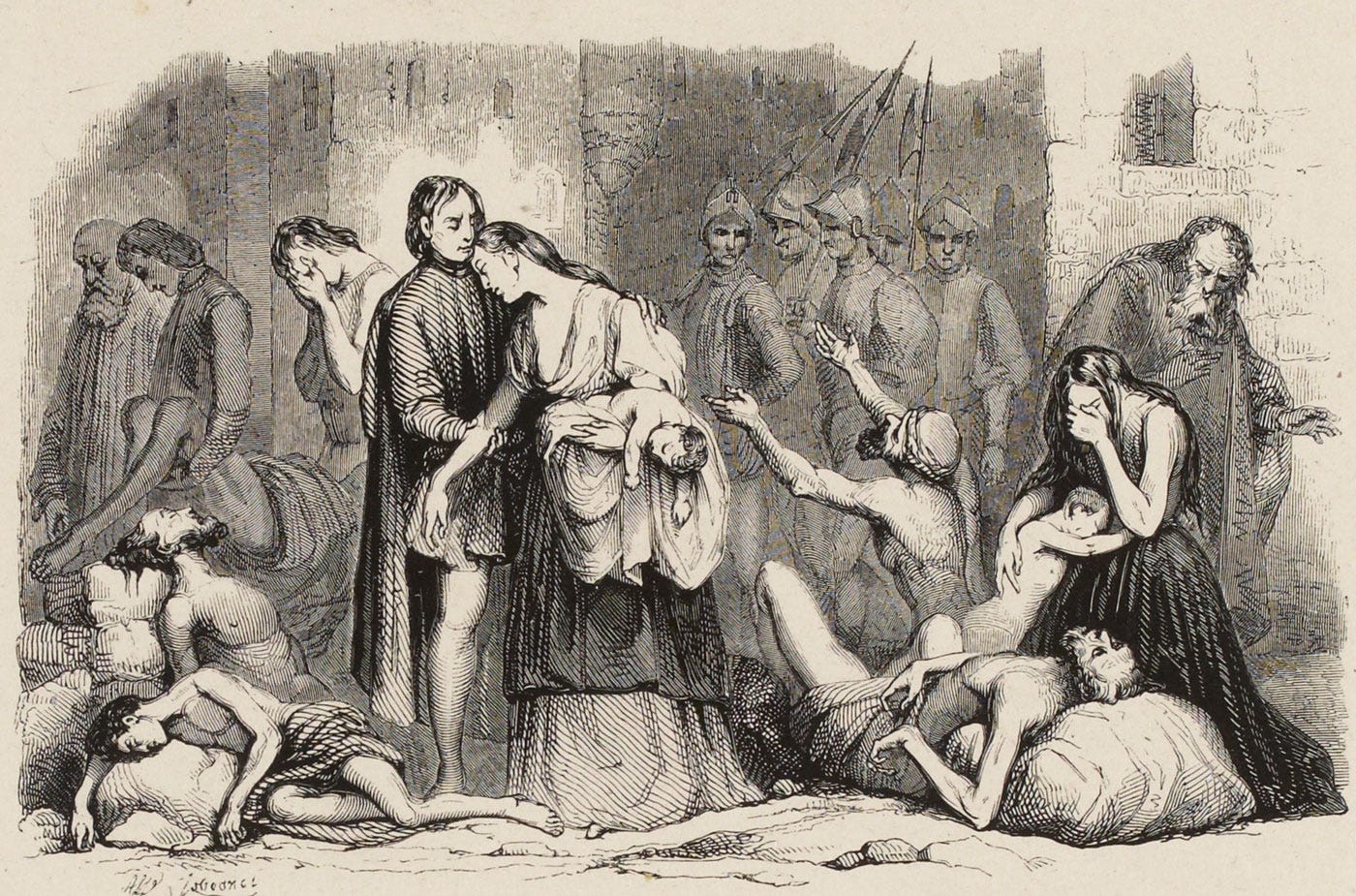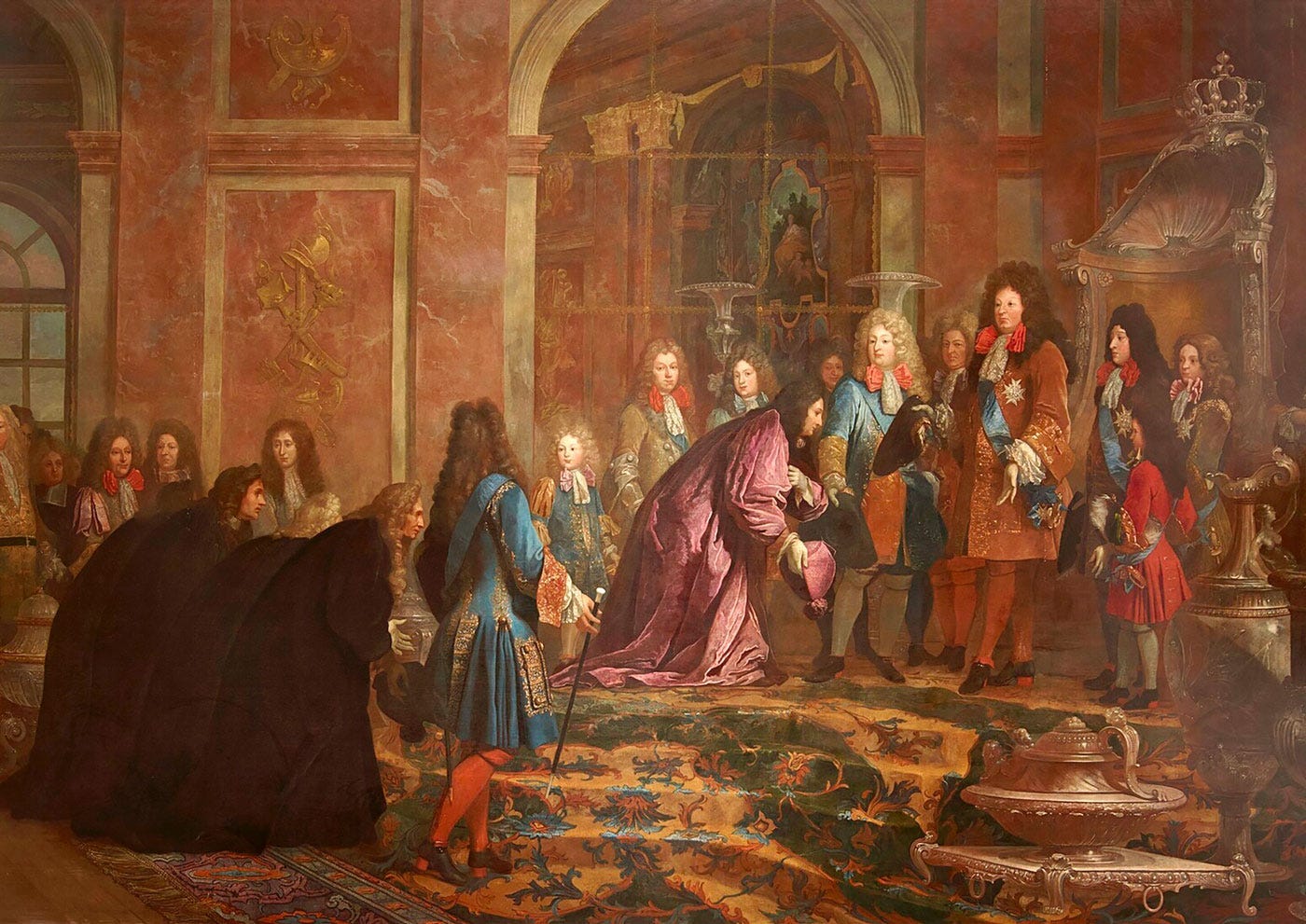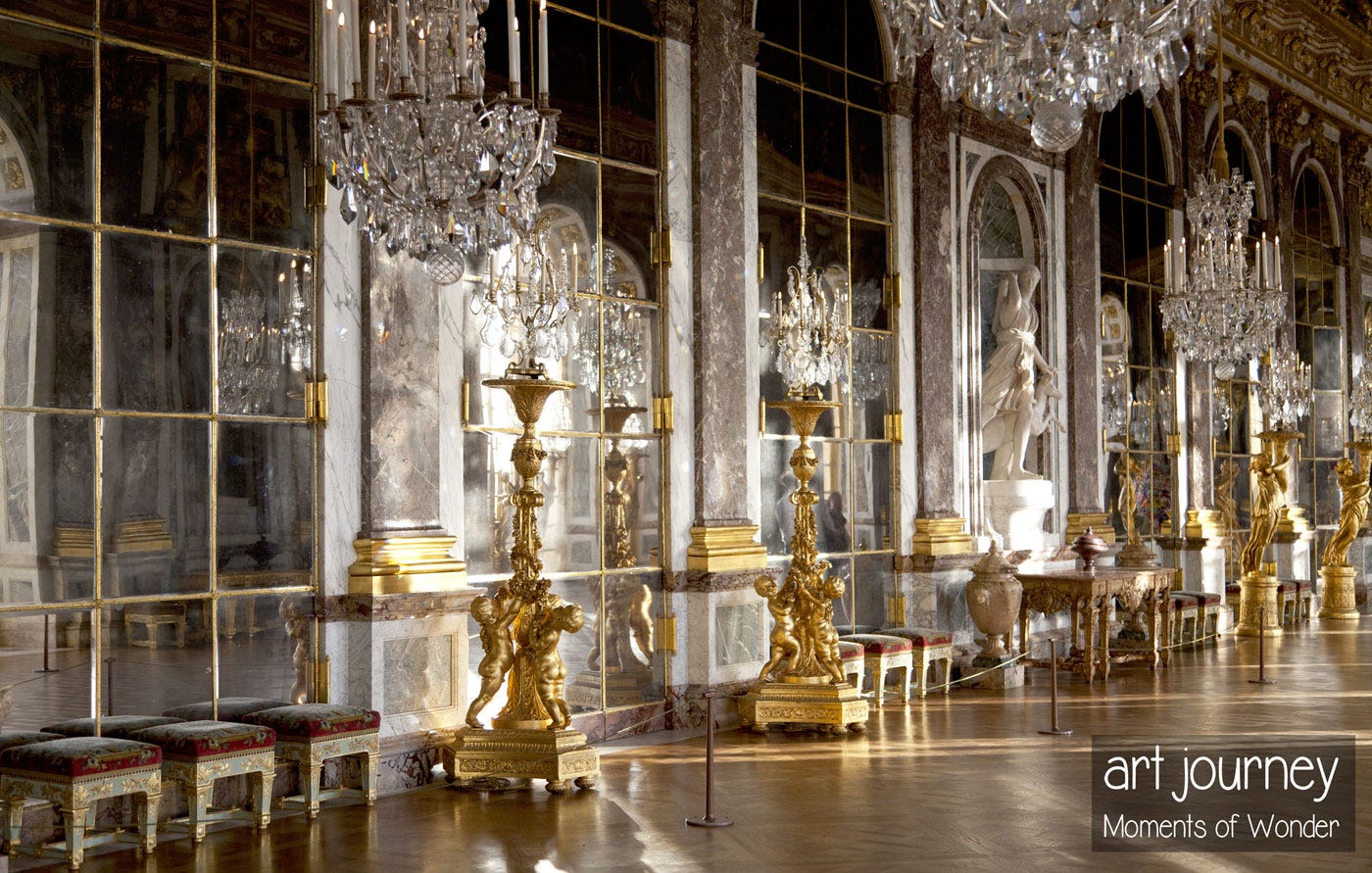Versailles, the wonder and the 'monstrous luxury'.
Beyond the myths, revealing the good and bad about Louis XIV and Versailles.
Dear reader, these articles are meant to offer you a moment of awe. One way to reach that is to ponder how much myth and reality differ and learn from the past.
Telling the story of Louis XIV is about choice: do we focus on the good or the bad? Here, we tell both sides.
Versailles, from hunting lodge to world heritage site
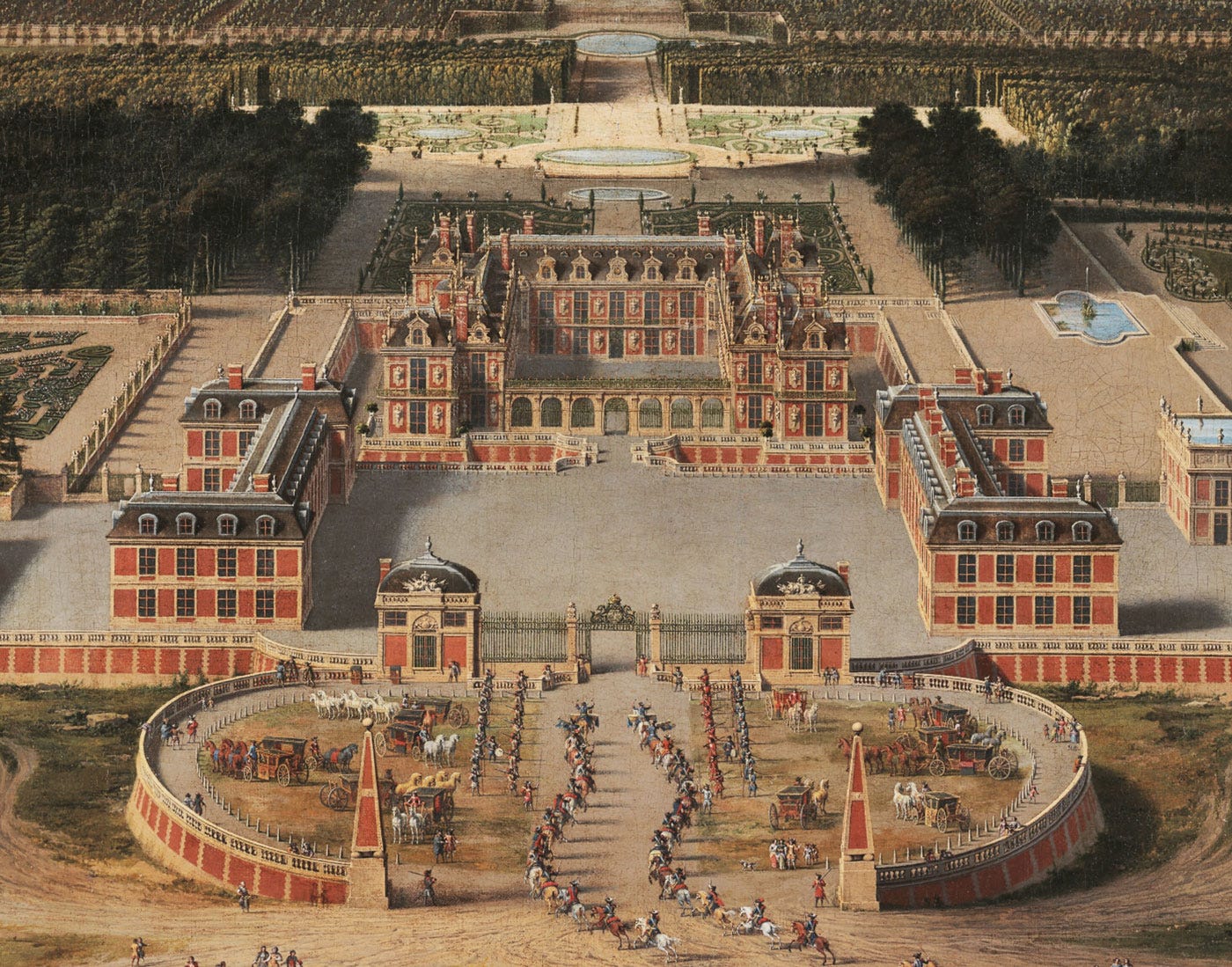
Why is Ramses II 'Great'? Not because of the military battles, but because he built monuments and statues up and down Egypt, making him the most prolific builder of ancient Egypt.
The recipe Louis XIV used to become 'Great' was identical. It was not the incessant—and ruinous—military campaigns but the building of a magnificent palace. But why build a castle in the middle of a swamp outside Paris?
Louis XIII died when his son was not even five years old. That child's formative years were not a fairy tale; he had a quasi-revolution to deal with. It was a time of danger and betrayal, having to flee Paris for his safety, something he never forgot.
Remember, dear reader, that about the same time in England, there was a revolution, and Charles I was beheaded. The British ended up with a powerful Parliament, which forthcoming Kings had to compromise with.
In France, the answer to the threats to young Louis XIV was absolute power.
Absolute power in marble and gold
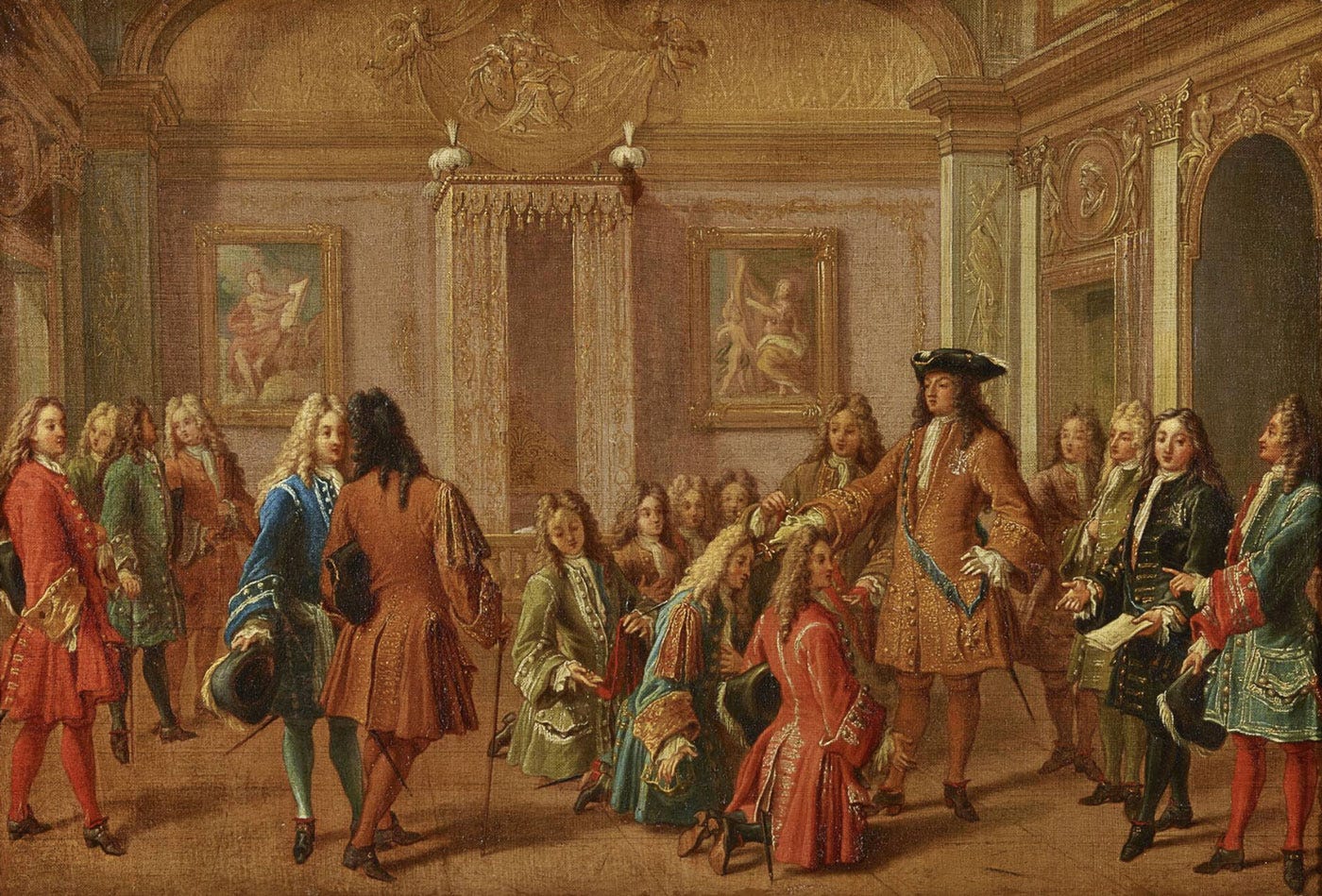
In the story about Versailles' prototype, I translated in English the very words Louis XIV uttered hours after the death of his prime minister:
Gentlemen, I had you assembled here to tell you that I now intend to govern my State by myself.
The face of the theatre is changing.
You know my wishes; it is now up to you, Gentlemen, to carry them out.
The nobility and the courts of justice had turned against the boy King. Once he became the first King in French history to possess absolute power, it became time to turn on the nobles who betrayed him when he was weakest.
This thread guides the design of Versailles: taming nature and nobles. For the gardens, a swamp was drained and turned into architecture, where plants were designed with a ruler.
For the nobles, there had never been a castle large enough to house all the French nobility under one roof until then. The nobility lived in their castles in previous generations and had plenty of opportunities to scheme. Versailles became a gilded prison for nobility.
They had little to do but hope to get close to Louis, so they fought each other to get close to their master. Nobles jousted for the honor of holding the candle for the King. He made them pay to access his bedroom so they could witness the King get out of bed.
The King’s bedroom is the beating heart, the physical center of the castle. Versailles was a theatre stage, with only one actor, Louis XIV.
The cost of building Versailles

It isn't easy to translate the value of money from the past to today. During Louis XIV's reign, the average worker's yearly wage was 100 pounds. In the countryside—most of France—a small home costs about 200 pounds. One was considered wealthy when earning over 10,000 pounds a year.
The cost of building Versailles' castle, gardens, water systems, and furnishings was 100 million pounds.
What would it mean today? One million years of salary? In terms of work, we have the tally of the man-hours needed to build Versailles: 1,6 billion hours. Building Versailles today would cost tens of billions if we use this as a basis. As we will see, it was a bad investment in the short term, but in the long term, it was a very good one.
Another way to imagine the costs is to consider the solid silver furniture made for Louis XIV. It was not wood covered with silver—no, twenty tons of precious metal chiseled into the throne, tables, and furniture.
It cost 10 million pounds, but a few years later, it was melted down and sold for 2 million.
With its mirrored gallery and magnificence, Versailles claimed to the world that Louis was Louis le Grand—Louis the Great. That is the good part, and now, we discuss the other side of the coin.
The terrible famines at the end of Louis XIV's reign
During Louis XIV's last years, his people had to resort to praying to be spared plagues, famines, and wars. He drained the economy with his military conquests. Then there were the winters of 1694 and 1709, when two million people died, either of starvation or disease.
That represents 10% of the population, and more loss of life in France than in the First World War. The cause of death was written as 'hunger and misery.' I will not give you nightmares by explaining what people had to do to eat.
A scathing indictment of Louis XIV's reign
The 1694 famine prompted Fénelon, a bishop and man of letters, to write an anonymous letter to Louis XIV, clearly laying out who was responsible. It is translated into English for this story:
For about thirty years, no one has spoken of the State or the rules; they have spoken only of the King and his good pleasure. They have pushed your income and your expenses to infinity.
They have raised you to the heavens, for having erased, it was said, the greatness of all your predecessors together.
That is to say, for having impoverished the whole of France, in order to introduce at court a monstrous and incurable luxury.
Meanwhile, your people, whom you should love like your own children, and who have been so passionate about you until now, are dying of hunger.
Instead of drawing money from these poor people, one should give them alms and feed them.
All of France is nothing more than a vast, desolate hospital without provisions.
It is you yourself, Sir, who have brought all this trouble upon yourself. For, the entire kingdom having been ruined, you have everything in your hands, and no one can live except from your gifts.
This great kingdom is so flourishing under a King who is portrayed to us every day as the delight of the people, and which would indeed be so if flattering advice had not poisoned it.
The cost of absolute power
The letter also criticizes the fact that there are no restraints on the King:
You live as if you have a fatal blindfold over your eyes. Everyone sees it, and no one dares to show it to you. Perhaps you will see it too late.
You love only your glory and your comfort. Everything is about you, as if you were the God of the earth, and everything else had been created solely to be sacrificed to you.
As if you were the God of the earth... If it were a boxing match, Louis XIV would have been knocked out by Fénelon's relentless punches.
But the blows never landed on Louis' face, as he likely never received the letter.
Religious intolerance, the expulsion of the Huguenots
There's more to the dark side of Louis XIV: his decision to expel Protestants from France. His grandfather, Henri IV, was a Protestant who became Catholic as a condition to sit on the French throne.
Henri IV brought about peace between the warring factions. His grandson, now an absolute monarch, unable or unwilling to heed the advice, decided to rescind the treaty of tolerance toward Protestants. As a result, about 200,000 French Huguenots left, a tragic loss for France.
Louis XIV's dying words to his successor, Louis XV
Close to death, Louis XIV reportedly said to his successor, five-year-old Louis XV:
Endeavor to preserve peace with your neighbors. I have been too fond of war; in this do not follow my example any more than in my too expensive manner of living.
Take counsel in everything. Endeavor to distinguish what is best, and always take care to pursue it.
Relieve your subjects as much as you can, and do what I have been so unhappy as not to be able to do myself.
Too late, Louis XIV considered the cost of war and the need to listen to advice.
Versailles, peak soft power
Now, enough darkness; it's time for Wonder. Unlike in movies, where a story is either good or bad, reality is more complicated and, hence, more interesting. I mentioned earlier that Versailles' cost was a good investment in the long term.
The benefit is soft power. What is it? The ability for a country to influence others using its culture, values, and policies. Regarding values and policy, Versailles is still used today for major summits and official visits. It remains an instrument of power.
And what about cultural influence? Why do you celebrate with Champagne and dream of French perfume, jewelry, and fashion? Look no further than the name of the non-profit promoting French luxury houses, the Comité Colbert.
Who is this Colbert, you ask?
No, not the Late Show with Stephen Colbert—a valuable export in its own right—but Louis XIV's minister. Colbert was the iron hand inside the silk glove who created the manufactures needed for Versailles' decor and furniture.
European courts were dazzled by the style, arts, and gastronomy at Versailles. That effect is still felt today, and that is soft power.
The moral of the story is a message to politicians. Consider using a small portion of the money spent on war on the arts and education. One tangible, short-term benefit is putting food on millions of tables.
The upside to you, Mr. politician, is securing your place in history and turning you into a positive figure people will look up to for millennia—someone for whom statues are erected instead of being smashed.
If you want to become Great for eternity, it is very easy: spend less money on bombs and more on creating and sharing Moments of Wonder.
Sources:
Lettre de Fénelon à Louis XIV, translated by the author.
Louis XIV declaration at Vincennes, 9 March 1661, Louis-Henri de Loménie, comte de Brienne Mémoires de Louis-Henri de Loménie, comte de Brienne, dit le Jeune Brienne. T.3. - translated by the author.
The Works of Voltaire, Vol. XII (Age of Louis XIV).






